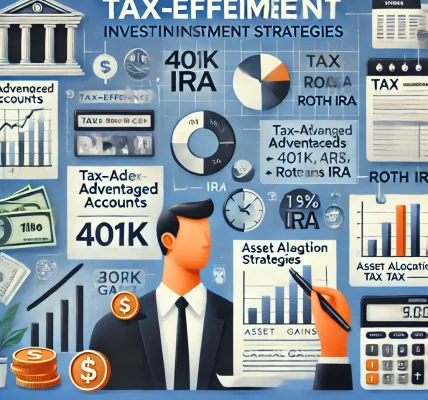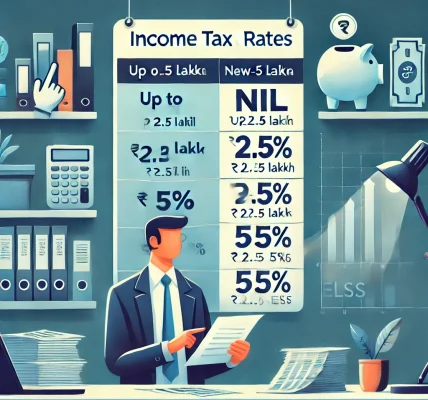Introduction
Earning rental income is a great way to build wealth, but it also comes with tax obligations. As a landlord, understanding the tax rules on rental income can help you legally minimize your tax burden and maximize profits.
In this guide, we’ll cover:
- How rental income is taxed
- Key deductions available to landlords
- Strategies to reduce tax liabilities
- Common mistakes to avoid
By following these tax-saving strategies, you can ensure compliance while keeping more money in your pocket!
1. Understanding Rental Income Taxation
How is Rental Income Taxed?
Rental income is added to your total income and taxed as per the applicable income tax slab rates.
Rental income includes: ✔ Monthly rent received from tenants ✔ Advance rent received ✔ Security deposit (if non-refundable) ✔ Any additional payments from tenants (e.g., maintenance covered by tenants)
Tax Formula for Rental Income: Net Taxable Rental Income = Gross Rental Income – Deductions & Exemptions
Tax on Multiple Properties
If you own multiple rental properties, taxation rules vary based on self-occupied vs. let-out properties.
- If you have more than two self-occupied properties, the additional ones are deemed to be rented out, even if they are vacant.
- Tax must be paid on the notional rent (estimated rental value as per market rates).
2. Key Deductions Available to Landlords
To reduce taxable rental income, landlords can claim the following deductions:
a) Standard Deduction (Flat 30%)
Under Section 24(a), landlords can claim a 30% standard deduction on rental income for maintenance and repair costs, regardless of actual expenses.
b) Home Loan Interest Deduction
If you have taken a home loan for the rented property, you can claim 100% of the interest paid as a deduction under Section 24(b).
c) Property Tax Deduction
Property tax paid on the rental property can be fully deducted from rental income before calculating taxes.
d) Depreciation on Rental Property
If you rent out a commercial property, depreciation can be claimed as a deduction to reduce taxable income.
e) Municipal and Maintenance Charges
If you, as a landlord, bear maintenance charges, society fees, or municipal taxes, these can be deducted.
f) Repairs and Renovation Expenses
Major repairs and improvements on the rental property can be deducted as expenses under capital expenditure rules.
g) Legal & Professional Fees
Any legal fees for property management, lease agreements, or tenant disputes can be deducted.
3. Tax-Saving Strategies for Landlords
1. Opt for Joint Ownership
If you own rental property jointly with a spouse or family member, you can split rental income and enjoy lower tax slabs.
2. Register as a HUF (Hindu Undivided Family)
Landlords in India can register as a HUF to separate rental income from personal income and reduce tax liability.
3. Invest Rental Income into Tax-Saving Instruments
- Invest rental income in PPF, ELSS, NPS, or tax-free bonds to reduce taxable income.
- Consider Section 54 exemptions for capital gains reinvested into another property.
4. Claim Additional Exemptions Under Section 80C
- If you are paying principal repayment on a home loan, you can claim a deduction under Section 80C (up to ₹1.5 lakh per year).
- Other tax-saving investments like EPF, PPF, LIC premiums, and NSC can further reduce your tax burden.
5. Utilize the Presumptive Taxation Scheme (For Small Landlords)
If your rental income is under ₹50 lakhs per year, you can opt for the presumptive taxation scheme under Section 44AD, where only a small portion of rental income is taxed.
6. Offset Losses Against Other Income
If you have a loss from a rental property due to a home loan, you can offset it against other income sources to reduce overall tax liability.
7. Maintain Proper Documentation
- Keep rental agreements, property tax receipts, and maintenance bills.
- Proper documentation helps claim deductions and avoid legal issues.
4. Common Tax Mistakes Landlords Should Avoid
🚫 Not Reporting Rental Income: Many landlords underreport rent to avoid taxes, which can lead to penalties.
🚫 Not Deducting Property Tax: Many property owners forget to claim property tax deductions, increasing tax liability.
🚫 Not Keeping Rental Agreements Updated: Ensure rental agreements are legally registered and updated for clarity and taxation purposes.
🚫 Ignoring GST on Rental Income (If Applicable): If your rental income exceeds ₹20 lakh annually (for commercial properties), you need to register for GST and charge 18% GST.
Conclusion
Rental income taxation is an important aspect of real estate investment. By leveraging available deductions, structuring ownership properly, and investing wisely, landlords can legally reduce tax liabilities.
Key Takeaways:
✅ Standard deduction of 30% applies automatically ✅ Home loan interest is fully deductible ✅ Property tax, maintenance, and legal fees are deductible ✅ Joint ownership and HUF structures help reduce taxes ✅ Invest rental income wisely to save more ✅ Proper documentation helps in tax audits and legal compliance




